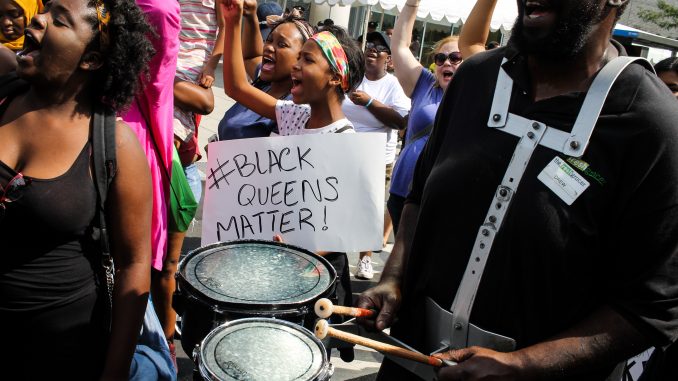
India Fenner often looks to the words of Malcolm X for motivation.
“The most disrespected woman in America is the Black woman. The most unprotected person in America is the Black woman. The most neglected person in America is the Black woman,” the civil rights activist said in a 1962 speech titled, “Who Taught You to Hate Yourself?”
Fenner, a sophomore African American studies and political science major, said she has always strived to support and uplift fellow Black women.
And on Friday, she led more than 100 people up Broad Street from City Hall to Cecil B. Moore Avenue in the March for Black Women, which she organized to accomplish just that.
Fenner said she was concerned with the lack of representation Black women have in history and in the modern day.
“I was born an activist, and I’ve been attending marches and protests, but they’ve all been for Black men who have been harassed and killed by police,” Fenner said.
Once, she attended a march in Philadelphia for Sandra Bland, a Black woman who was found dead in a Texas jail cell in 2015. Bland was arrested for the charge of assaulting a public servant after an argument with former Texas state trooper Brian Encinia, who pulled Bland over for failing to use her turn signal.
This march was the only one Fenner knew of that revolved around a Black woman, she said.
“It was a small protest, and that’s what really made me think about why we don’t focus on Black women,” Fenner said.
In January, the Women’s March in Washington, D.C., drew hundreds of thousands of attendees. For Fenner, however, the march did not bring attention to Black women.
“The Women’s March was not for us,” Fenner said.
“It was nice and cute and was for a great cause, but it didn’t focus more on us,” she added. “We still face other issues, like depression and racism, that white women don’t face.”
So Fenner created her own march.
To get the word out, Fenner took to her Facebook account. She emphasized that the march was inclusive, seeking to call people of all genders and races to support Black women and girls across America.
Her friends, the speakers and performers at the march also helped spread the word, she said. On the Facebook event Fenner created, nearly 700 people said they were interested in attending. The numbers were higher than Fenner had expected.
At the march, dozens of participants brandished homemade signs, bearing phrases like “Black queens matter” and “Don’t underestimate her, she’s glowing with power.” Drummers pounded a rhythm as the group walked toward Main Campus. Writing #SayHerName onto a sign, Fenner displayed the names of women affected by police brutality. She included not only the women killed, but the wives, daughters and mothers of Black men who have died.
“It’s fine that people show that, yes, we are not perfect, yes, we have our problems, but I’m tired of people bringing up reasons as to why we deserved to be abused in any type of way,” she said. “So that’s why this march is important.”
Fenner hopes to organize similar marches in the future.
“This is my first one, but it definitely won’t be my last,” she said.


Be the first to comment